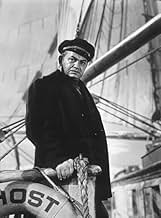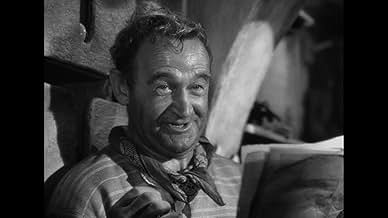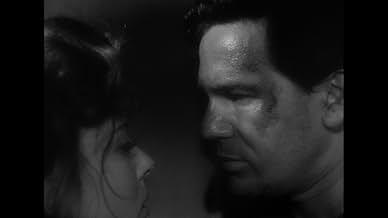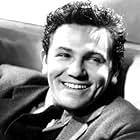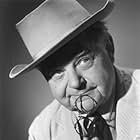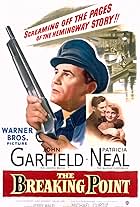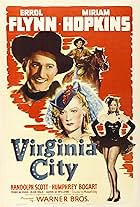IMDb RATING
7.5/10
4.6K
YOUR RATING
After being fished out of the sea by a sailing ship, three fugitives find themselves prisoners of the ship's brutal skipper who refuses to put them ashore, and they hatch an escape plan duri... Read allAfter being fished out of the sea by a sailing ship, three fugitives find themselves prisoners of the ship's brutal skipper who refuses to put them ashore, and they hatch an escape plan during a crew mutiny.After being fished out of the sea by a sailing ship, three fugitives find themselves prisoners of the ship's brutal skipper who refuses to put them ashore, and they hatch an escape plan during a crew mutiny.
- Nominated for 1 Oscar
- 2 nominations total
Ernie Adams
- Pickpocket
- (uncredited)
Cliff Clark
- First Detective
- (uncredited)
Jeane Cowan
- Singer
- (uncredited)
Richard Cramer
- Bartender
- (uncredited)
William Gould
- Second Detective
- (uncredited)
Ralf Harolde
- Agent Getting Johnson Shanghaied
- (uncredited)
Oscar 'Dutch' Hendrian
- Crewman
- (uncredited)
- Director
- Writers
- All cast & crew
- Production, box office & more at IMDbPro
Storyline
Did you know
- TriviaThe first movie to have its world premiere on a ship: the luxury liner "America", during a trip from San Francisco to Los Angeles.
- GoofsUntil the era of the 1st World War, the practice on board a ship was to call orders for the helmsman to move the tiller either to port or to starboard. Calling "hard a-port" meant moving the tiller to port, which means the rudder and the vessel, will then move to starboard. With wheel steering, putting the helm/tiller to port, means spinning the wheel to starboard. Ships no longer use this system - these days helm directions refer to the desired turn of the rudder/vessel. The James Cameron movie "Titanic" also contained a similar scene, which generated a lot of puzzlement. It IS a bit confusing at first, unless one is a sailor and is familiar with tiller steering.
- Quotes
Humphrey Van Weyden: There's a price no man will pay for living.
- Alternate versionsThe film was cut by approximately 12 minutes down to less than 90 minutes for re-issue. The deleted footage consisted of little, but integral, moments throughout the story which added considerably to the quality of the film as a whole. For many years, the only known existing print of the original 99-minute theatrical version was a 16mm print which belonged to the film's star, John Garfield. However, Warner Brothers studio recently discovered a 35mm print of this original version at the Museum of Modern Art in New York City. It was subsequently restored and used for distribution on DVD and Blu Ray.
- ConnectionsEdited into The Sea Wolf (1993)
- SoundtracksHello! Ma Baby
(uncredited)
Music by Joseph E. Howard
Lyrics by Ida Emerson
Played on piano and sung by Jeane Cowan in the bar
Featured review
The London classic has been filmed many times, but never better than here. It's Warner Bros. operating on all 8 cylinders, from casting, to directing, to art department and special effects. So who better to play the maniacal captain than Edward G, Robinson at his snarling prime, or the rebellious ex-con than John Garfield at his defiant prime, or the downtrodden girl than Ida Lupino at her soulful prime. Together they're a dynamite cast, and even the snobbish Alexander Knox manages his literary role in fairly sympathetic fashion. It's atmospheric the whole way with the aptly named Ghost slipping through one fog bank after another.
The Robert Rossen adaptation is less philosophical than others. Robinson's Wolf Larson acts more out of psychological compulsion than philosophical principle. His battle of wits with Knox's Humphrey van Weyden is more about Freudian ego than the merits of a Nietschean superman. Larson desires power to prove his own self and not to prove a larger point about ruthlessness and the struggle to survive. I suspect that had the movie been made a few years later, Hitlerian comparisons would have been drawn. Then too, when there's talk of the ship's "downtrodden" crew being freed at last, it's likely the leftish Rossen has more than a ship's crew in mind. Too bad that the commanding Howard deSilva doesn't have a larger role which would have made the outlaw ship even more hellish.
Note the informal wedding vows exchanged between Lupino and Garfield at movie's end. The lines are rather clumsy and out-of-step with the rest of the script. I suspect the censors required some such vows before the couple were allowed to live together on a deserted island after leaving the ship. Even though this seems a reach, I gather censorship concerns could indeed reach to such an implied level. Be that as it may, the Robinson performance is powerfully riveting and not to be missed. All in all, the movie remains a fine example of ensemble film-making and a tribute to Hollywood's old studio system.
The Robert Rossen adaptation is less philosophical than others. Robinson's Wolf Larson acts more out of psychological compulsion than philosophical principle. His battle of wits with Knox's Humphrey van Weyden is more about Freudian ego than the merits of a Nietschean superman. Larson desires power to prove his own self and not to prove a larger point about ruthlessness and the struggle to survive. I suspect that had the movie been made a few years later, Hitlerian comparisons would have been drawn. Then too, when there's talk of the ship's "downtrodden" crew being freed at last, it's likely the leftish Rossen has more than a ship's crew in mind. Too bad that the commanding Howard deSilva doesn't have a larger role which would have made the outlaw ship even more hellish.
Note the informal wedding vows exchanged between Lupino and Garfield at movie's end. The lines are rather clumsy and out-of-step with the rest of the script. I suspect the censors required some such vows before the couple were allowed to live together on a deserted island after leaving the ship. Even though this seems a reach, I gather censorship concerns could indeed reach to such an implied level. Be that as it may, the Robinson performance is powerfully riveting and not to be missed. All in all, the movie remains a fine example of ensemble film-making and a tribute to Hollywood's old studio system.
- dougdoepke
- May 28, 2008
- Permalink
Details
Box office
- Budget
- $1,013,217 (estimated)
- Gross worldwide
- $6,192
- Runtime1 hour 40 minutes
- Color
- Aspect ratio
- 1.37 : 1
Contribute to this page
Suggest an edit or add missing content



